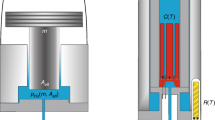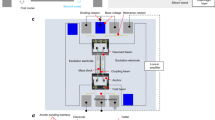Abstract
IT is known that the range of a hot-wire vacuum gauge may be extended to 10 mm. mercury pressure or above, if by some means the current supplied to the wire is increased with increasing pressure1,2. Attempts have been made to do this with the aid of automatic devices. Such a gauge becomes easier to handle, and there is then no danger of overloading. One of these circuits (suggested in principle by Mr. G. von Dardel) (Fig. 1) consists of an amplifier tuned on 800 c.p.s. A regenerative feed-back is provided by a bridge containing the hot wire. The amplitude of oscillations adjusts itself to keep the temperature of the wire approximately constant at all pressures. The amplitude is read by a diode circuit. Two ranges of sensitivity are provided. The output meter is protected from dangerous overloading by a rectifier which, however, distorts the readings slightly.
This is a preview of subscription content, access via your institution
Access options
Subscribe to this journal
Receive 51 print issues and online access
$199.00 per year
only $3.90 per issue
Buy this article
- Purchase on Springer Link
- Instant access to full article PDF
Prices may be subject to local taxes which are calculated during checkout
Similar content being viewed by others

References
Knudsen, M., Ann. d. Phys., 34, 593 (1911).
Rittner, E. S., Rev. Sci. Instr., 17, 113 (1946).
Author information
Authors and Affiliations
Rights and permissions
About this article
Cite this article
VON UBISCH, H. A New Hot-Wire Vacuum Gauge. Nature 161, 927–928 (1948). https://doi.org/10.1038/161927b0
Issue Date:
DOI: https://doi.org/10.1038/161927b0
Comments
By submitting a comment you agree to abide by our Terms and Community Guidelines. If you find something abusive or that does not comply with our terms or guidelines please flag it as inappropriate.


